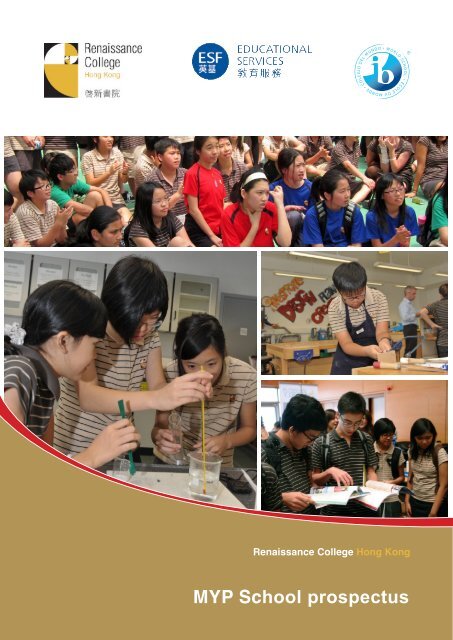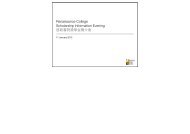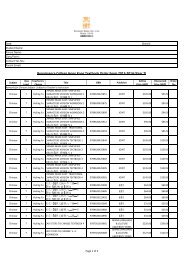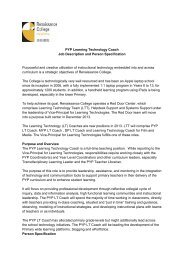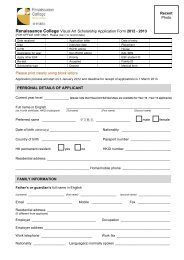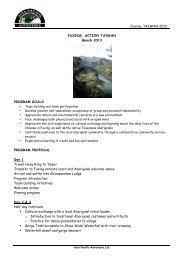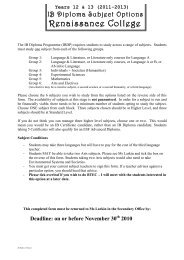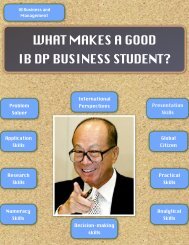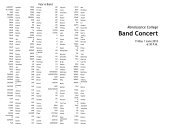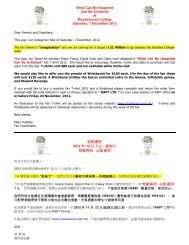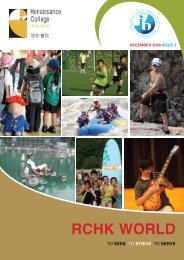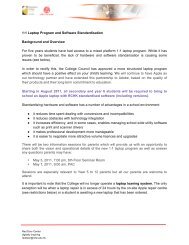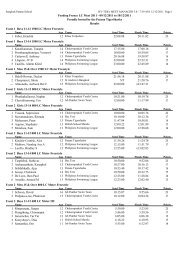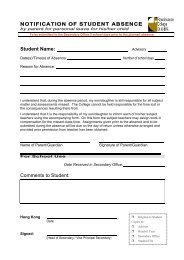MYP Prospectus 2012-13 - Renaissance College
MYP Prospectus 2012-13 - Renaissance College
MYP Prospectus 2012-13 - Renaissance College
Create successful ePaper yourself
Turn your PDF publications into a flip-book with our unique Google optimized e-Paper software.
<strong>Renaissance</strong> <strong>College</strong> Hong Kong<br />
<strong>MYP</strong> School prospectus
Contents<br />
Section 1<br />
Introduction 2<br />
Section 2<br />
The International Baccalaureate 3<br />
Section 3<br />
The IB Learner Profile 4<br />
Section 4<br />
The Middle Years Programme (<strong>MYP</strong>) 5<br />
Section 5<br />
<strong>MYP</strong>: The Essentials 6<br />
Section 6<br />
<strong>MYP</strong>: Areas of Interaction 9<br />
Section 7<br />
<strong>MYP</strong>: Subject Areas 11<br />
Section 8<br />
<strong>MYP</strong>: Assessment 12<br />
Section 9<br />
<strong>MYP</strong>: Personal Project 14<br />
Section 10<br />
<strong>MYP</strong> Certificate & Record of Achievement 15
Section 1: Introduction<br />
<strong>Renaissance</strong> <strong>College</strong> Mission Statement<br />
Through a curriculum that is both rigorous and holistic, the <strong>College</strong> will develop global<br />
citizens who strive for academic excellence, appreciate the aesthetics and are<br />
empowered to take progressive action.<br />
RCHK strives to build a culture, which promotes peace and democracy, values diversity,<br />
and works toward a sustainable future for all.<br />
We aim to deliver an education that is rigorous and holistic. To that end, the <strong>College</strong> has chosen to offer<br />
all three International Baccalaureate (IB) programmes, the Primary Years Programme (PYP), the Middle<br />
Years Programme (<strong>MYP</strong>), and the Diploma Programme (DP).<br />
The <strong>MYP</strong> is designed for students aged 11 to 16 years. The <strong>MYP</strong> encourages students to be life-long<br />
learners who are adaptable and willing to accept change. In this age of rapid change and technological innovation,<br />
students need to be equipped with the skills necessary to process new knowledge, interpret and<br />
process it, and use it effectively.<br />
page 2
Section 2:<br />
The International Baccalaureate Organization (IB)<br />
Today the IBO offers three educational programmes for schools to follow:<br />
• The Diploma Programme (DP) is an internationally recognised two-year pre-university course for students<br />
aged 16 to 19. It was established in the late 1960’s and RCHK was authorised to offer the DP in May<br />
2007.<br />
• The Middle Years Programme (<strong>MYP</strong>) is a five-year programme for students aged 11 to 16. It was<br />
introduced in 1992 and RCHK was authorised to offer the programme in November 2007.<br />
• The Primary Years Programme (PYP) is a six-year programme for students aged 3 to 12. It was<br />
introduced in 1997 and RCHK was authorised to offer the programme in March 2008.<br />
• RCHK is the second school in Hong Kong authorised to offer all three IB programmes.<br />
What are the common links between these three programmes<br />
• Educating the whole person<br />
• Responsible citizenship<br />
• Broad and balanced curriculum<br />
• International understanding<br />
• Importance of effective communication<br />
page 3
Section 3: IB Learner Profile<br />
The aim of all IB programmes is to develop global citizens who recognise their common humanity and<br />
shared guardianship of the planet, and are committed to creating a better and more peaceful world.<br />
IB Learners strive to be:<br />
Inquirers<br />
They develop their natural curiosity. They acquire the skills necessary to conduct inquiry<br />
and research and show independence in learning. They actively enjoy learning and this<br />
love of learning will be sustained throughout their lives.<br />
Knowledgeable They explore concepts, ideas and issues that have local and global significance. In so<br />
doing, they acquire in-depth knowledge and develop understanding across a broad and<br />
balanced range of disciplines.<br />
Thinkers<br />
They exercise initiative in applying thinking skills critically and creatively to recognise<br />
and approach complex problems, and make reasoned, ethical decisions.<br />
Communicators They understand and express ideas and information confidently and creatively in more<br />
than one language and in a variety of modes of communication. They work effectively<br />
and willingly in collaboration with others.<br />
Principled<br />
They act with integrity and honesty, with a strong sense of fairness, justice and respect<br />
for the dignity of the individual, groups and communities. They take responsibility for<br />
their own actions and the consequences that accompany them.<br />
Open-minded<br />
They understand and appreciate their own cultures and personal histories, and are open<br />
to the perspectives, values and traditions of other individuals and communities. They are<br />
accustomed to seeking and evaluating a range of points of view, and are willing to grow<br />
from the experience.<br />
Caring<br />
They show empathy, compassion and respect towards the needs and feelings of others.<br />
They have a personal commitment to service, and act to make a positive difference to<br />
the lives of others and to the environment.<br />
Risk-takers<br />
They approach unfamiliar situations and uncertainty with courage and forethought, and<br />
have the independence of spirit to explore new roles, ideas and strategies. They are<br />
brave and articulate in defending their beliefs.<br />
Balanced<br />
They understand the importance of intellectual, physical and emotional balance to<br />
achieve personal well-being for themselves and others.<br />
Reflective<br />
They give thoughtful consideration to their own learning and experience. They are able<br />
to assess and understand their strengths and limitations in order to support their learning<br />
and personal development.<br />
page 4
Section 4: The Middle Years Programme (<strong>MYP</strong>)<br />
Background<br />
The <strong>MYP</strong> began as an initiative of the International Schools Association in the early 1980s. The curriculum<br />
shared much of the same philosophy as the Diploma Programme and was intended as a lead-in to the<br />
IB Diploma Programme. The first draft of the curriculum was produced in 1987. Emphasis was placed on<br />
developing the skills, attitudes and knowledge needed to participate in an increasingly global society, while<br />
meeting the particular needs of 11 to 16 year olds.<br />
<strong>MYP</strong> Around The World<br />
There are now more than 918 authorized schools in over 75 different countries, with many more schools<br />
implementing the programme and seeking authorisation. Schools in the Asia-Pacific region have embraced<br />
the <strong>MYP</strong>.<br />
Why Do Schools Adopt The <strong>MYP</strong><br />
• The <strong>MYP</strong> philosophy is an obvious choice for international schools.<br />
• It provides national schools the opportunity to offer a more international perspective.<br />
• In many regions the <strong>MYP</strong> is seen as superior to the local curriculum, providing quality assurance for<br />
parents and students in the middle years of secondary education.<br />
• Research into how students learn effectively shows the <strong>MYP</strong> philosophy and methodologies are<br />
particularly appropriate.<br />
• It is an academically rigorous programme with high standards ensured by the IB.<br />
The Main Characteristics Of The <strong>MYP</strong><br />
• Broad base of disciplines.<br />
• Balance of concepts, skills and processes.<br />
• Holistic approach to knowledge.<br />
• Attention to life skills, health and the environment.<br />
• Child-centred approach focusing on the cognitive, creative and physical development of adolescents.<br />
• Balance of formative and summative assessment, encouraging multiple forms of assessment.<br />
• Flexibility to meet both IBO and local requirements.<br />
page 5
Section 5: <strong>MYP</strong>: The Essentials<br />
The <strong>MYP</strong> Octagon<br />
This diagram shows the main focus of the <strong>MYP</strong> curriculum. At the centre is the profile of a child placed on the<br />
background of the globe. This symbolises the <strong>MYP</strong>’s ‘child-centred’ approach, and international perspective.<br />
On the first ring are the ‘Approaches to Learning’ - the essential ingredients for acquiring knowledge. Around<br />
this are the four ‘Areas of Interaction’ : Community and Service, Human Ingenuity, Environments, and Health<br />
and Social Education. At the eight points of the octagon are the subject areas. The subject areas provide the<br />
content through which the Areas of Interaction can be explored and linked.<br />
Fundamental Concepts<br />
There are three fundamental concepts that form the underlying philosophy for the <strong>MYP</strong>: intercultural<br />
awareness, holistic education and communication.<br />
Intercultural Awareness<br />
• This concept is concerned with developing students’ attitudes, knowledge and skills as they learn<br />
about their own and others’ social and national cultures. It not only encourages tolerance and<br />
respect, but also leads to empathy and understanding.<br />
• Students should be conscious of the shared humanity that binds all people together while respecting<br />
the variety of cultures and attitudes that make for the richness of life.<br />
page 6
• Students are expected to develop a genuine understanding of their own history and culture, and<br />
they are encouraged to appreciate the traditions of other people and other places.<br />
• Intercultural awareness goes beyond tolerance towards the ideas and artifacts of other<br />
cultures. It is a positive empathetic movement towards others, a readiness to act cooperatively in<br />
genuine exchange. It should promote the universal values common to civilised societies.<br />
• Developing intercultural awareness concerns everyone within the school community. At RCHK<br />
we are constantly evaluating and improving upon policies and practices with input from students,<br />
teachers, administrators and parents in practical activities.<br />
How does teaching and learning at RCHK promote intercultural awareness<br />
In individual subject curriculums, teachers choose themes and content that allow students to explore their<br />
own and other cultures. A wide variety of teaching/learning resources, methods and styles ensure that ways of<br />
learning from other cultures are valued and utilised. Special events and celebrations throughout the school year<br />
also promote the values of tolerance and understanding. Making use of the whole school community - teachers,<br />
students, parents and local organisations is vital in developing intercultural awareness at RCHK.<br />
Holistic Education<br />
• The <strong>MYP</strong> requires an approach to teaching and learning which extends beyond traditional school<br />
subjects. The programme emphasises the disciplined study of traditional subject groups, while the<br />
‘Areas of Interaction’ provide a way to develop links between the disciplines.<br />
• Holistic education helps students realise that most real-world problems require insights gained<br />
from a variety of disciplines; they develop the skills of inquiry and understand the similarities and<br />
differences between approaches to human knowledge.<br />
page 7
How does teaching and learning at RCHK promote holistic education<br />
At RCHK, we aim to provide an holistic education by developing ‘Areas of Interaction’ within and across<br />
the academic disciplines, developing links between the subjects based on the AOIs. RCHK ensures that<br />
teachers communicate and coordinate learning activities across and within academic disciplines by providing<br />
common planning time, in which teachers can meet to discuss their curriculums and develop interdisciplinary<br />
activities. By using the ‘Areas of Interaction’ and increasing secondary teachers’ knowledge of other subject<br />
curriculums, we aim to produce an exciting and relevant interdisciplinary curriculum.<br />
Communication<br />
• The <strong>MYP</strong> stresses the central importance of communication, verbal and non-verbal, as a vehicle<br />
to realise the aims of the programme. A good command of expression in all of its forms is<br />
fundamental to learning and will be essential in the workplace of the future.<br />
• The IB places particular emphasis on language acquisition, which is regarded as crucial for<br />
maintaining cultural identity, personal development and intercultural understanding.<br />
• The ability to communicate one’s ideas in an appropriate form is seen as an essential skill.<br />
• Good communication is an expectation in all subject areas and is also a criterion of assessment for<br />
Science and Maths.<br />
How does teaching and learning at RCHK develop communication<br />
Through our languages programme, RCHK offers Putonghua and English at different levels in the <strong>MYP</strong>. We<br />
aim to offer students the opportunity to eventually communicate in more than one language. Where possible<br />
provisions will be made for students entering the programme who wish to pursue a mother tongue other than<br />
English or Putonghua. RCHK has a detailed language policy, available from the <strong>College</strong>.<br />
Individual subject areas actively promote a variety of learning skills that allow students to communicate<br />
information efficiently. A wide variety of assessment tasks are undertaken that demand multiple forms of<br />
expression, offering students various ways to communicate their knowledge.<br />
page 8
Section 6: <strong>MYP</strong>: Areas of Interaction<br />
Looking back at the <strong>MYP</strong> octagon you will notice two key sections: the ‘Areas of Interaction’ and the subject<br />
areas.<br />
How are the ‘Areas of Interaction’ addressed at RCHK<br />
The ‘Areas of Interaction’ create meaningful connections between subjects. The five ‘Areas of Interaction’<br />
give the <strong>MYP</strong> its distinctive core. They are taught in a coherent and creative way over the five years of the<br />
programme, in each subject and interdisciplinary teaching, projects and special programmes. They allow<br />
teachers and students to focus on “real world” aspects of subjects that are connected to current affairs.<br />
They help to highlight the holistic and inter-related nature of subjects.<br />
The Areas of Interaction are a vital part of the <strong>MYP</strong>. They are a central focus when teachers write the<br />
curriculum and plan their lessons. The AOIs enable teachers to complement content with a focus on skills,<br />
attitudes and values. The AOI’s also help students to gain a real life context for their learning.<br />
What are the five ‘Areas of Interaction’<br />
Approaches to Learning (ATL)<br />
The ATL represent general and subject-specific learning skills that students will develop and apply during<br />
the programme and beyond. The focus of this area is on teaching students how to learn and helping them<br />
find out more about themselves as learners.<br />
Community and Service<br />
Community and Service considers how a student engages with his or her immediate family, classmates<br />
and friends. Through effective planning and teaching, students can learn about their place within<br />
communities and be motivated to act in a new context.<br />
Health and Social Education<br />
Health and Social Education delves into a range of issues that exists in human societies, such as social<br />
structures, relationships and health. Students can identify and develop skills that will enable them to function<br />
as effective members of societies, identify how they are changing and how to make informed decisions that<br />
relate to their welfare.<br />
page 9
Environments<br />
This considers how humans interact with the world at large and the part we play in our environments. It extends<br />
into areas beyond human issues and asks students to examine the interrelationships of different environments.<br />
This area can lead students to consider their immediate classroom environments and global environments.<br />
Human Ingenuity<br />
Human Ingenuity deals with the way human minds have influenced the world, for example, the way we think,<br />
interact with each other, create, find solutions to and cause problems, transform ideas and rationalise thought.<br />
It also considers the consequences of human thought and action.<br />
page 10
Section 7: <strong>MYP</strong>: Subject Areas<br />
At RCHK, we embrace the philosophy of the <strong>MYP</strong> by offering a truly holistic education throughout the five<br />
years of the programme. This broad education means our students take at least one subject from each of the<br />
eight subject areas.<br />
The Subject Areas are:<br />
• Language A (mother tongue / language of instruction – English or Chinese)<br />
• Language B (second language - English or Chinese), or an additional language A<br />
• Science<br />
• Humanities<br />
• Physical Education<br />
• Technology<br />
• Arts (Visual Arts, Music and Drama)<br />
• Mathematics<br />
What are the Subject Aims and Objectives<br />
In each subject, the IBO expects students to achieve defined aims, skills and objectives while leaving the<br />
overall content up to the school. In some subjects there is a more prescriptive framework of topics that need<br />
to be included in the curriculum. Each subject area has a five-year scope and sequence developed specifically<br />
for the college.<br />
Aims and Objectives to be covered by all students:<br />
Knowledge: The facts students should be able to recall to ensure competence in the subject.<br />
Understanding: How students are able to interpret or predict aspects of the subject.<br />
Application: How students can apply what has been learned in new situations.<br />
Attitude: How the student is changed by the learning experience.<br />
For more detailed information on the different subject groups please refer to the RCHK website.<br />
How do we fit all of this into a school day<br />
In line with <strong>MYP</strong> philosophy, all students are expected to study the same broad and balanced curriculum from<br />
Year 7 to Year 11, covering the eight subject areas. Individual subjects are encouraged to integrate where<br />
possible. The IBO requires that all subjects must be studied for at least 50 hours per year. At RCHK we more<br />
than fulfill this requirement in each of the subjects.<br />
page 11
Section 8: <strong>MYP</strong>: Assessment<br />
<strong>MYP</strong> assessment is based on formative assessment. The aim of formative assessment is to help students<br />
understand their progress and ways they can improve their performance. This means students have to<br />
understand the methods of assessment and play an active role in the process.<br />
The assessment system used at RCHK is called a criterion-referenced model. Our students are assessed<br />
against prescribed standards or levels of achievement. This means that all students can achieve high grades<br />
as long as they meet these standards. The strength of this model is that students are assessed for what they<br />
can do, rather than being ranked against each other. Students are informed about the assessment criteria used<br />
to mark each piece of work, and receive feedback on their performance based on the level descriptors.<br />
Students may be assessed in some of the following ways: tests, essays, presentations, modeling, videos,<br />
reports and podcasts.<br />
What are our students taught to do<br />
• Understand the criteria and descriptors used for assessment in each subject<br />
• Compile their own assessment records in their student organisers<br />
• Assess themselves and their peers using the criteria<br />
What are teachers required to do<br />
• Encourage students to use the criteria when doing assignments and to hand in drafts so that they<br />
can receive feedback on each of the criteria.<br />
• Explain which assessment criteria will be used for a piece of work and give feedback to students.<br />
• Write task-specific achievement levels (rubrics) based on the criteria.<br />
• Assess students against the criteria.<br />
page 12
Some important points about assessment:<br />
• Each of the eight subject areas has different assessment criteria. These are based on each subject’s<br />
objectives and are a balance of concepts and skills.<br />
• The IB <strong>MYP</strong> Criteria of Assessment must be used in Year 11 of the programme, but in the other<br />
four years, schools are allowed to adapt the criteria<br />
• The <strong>MYP</strong> encourages teachers to develop a range of different assessment tasks to test a range<br />
of objectives and skills. These are used to collect data to award grades. This is seen as good<br />
educational practice, as educational research clearly shows that we all learn in different ways.<br />
A variety of different assessment tasks should allow more of our students to become “successful”<br />
at school.<br />
• In each subject students are awarded a final grade from 1 to 7. Teachers award individual criteria<br />
grades. The sum of these grades places the student in a grade band determined by the IBO.<br />
• Although there are no external exams in the <strong>MYP</strong>, standards are maintained by sending students’<br />
work away in the final year of the programme to be moderated by the IBO.<br />
• During the moderation process, teachers compile a sample of work from each subject. This<br />
sample is sent to IBO appointed and trained moderators, who ensure that schools are correctly<br />
assessing the students against the criteria. This creates standardised grades in the <strong>MYP</strong>.<br />
• All <strong>MYP</strong> students at RCHK are expected to sit internal examinations each year to learn how<br />
to perform under examination conditions.<br />
• Without compromising standards, assessment takes into account the requirements of students<br />
whose first language is not the language of instruction, and enables them to receive recognition for<br />
their higher order thinking skills.<br />
Where do our reports fit in<br />
Reports are issued four times a year. These interim and end of semester reports reports reflect the curriculum<br />
and assessment philosophy of the <strong>MYP</strong>. They include subject criteria grades and an effort / commitment grade.<br />
page <strong>13</strong>
Section 9:<br />
<strong>MYP</strong>: Personal Project<br />
The Personal Project is a significant piece of work produced over an extended period of time. At RCHK we<br />
start this process in March of Year 10, and complete it in January of Year 11. It is designed to be “personal”<br />
to the student and a product of the student’s own initiative and creativity.<br />
The Personal Project should be seen as the culminating activity of the Middle Years Programme as it ties<br />
together the techniques and strategies contained in ‘Approaches to Learning’ (ATL). It also addresses one or<br />
more of the other ‘Areas of Interaction’ and demonstrates the personal abilities and skills required to produce<br />
an extended piece of work.<br />
The students work with a supervisor over the period of the Personal Project and have regular scheduled<br />
meetings with their supervisor. The supervisor will generally be someone from within the school, but in some<br />
cases outside supervision is sought.<br />
Each student must produce a product alongside a structured piece of writing. The structured writing explains,<br />
in depth, the process the student followed in realising the final product. This piece of writing must not exceed<br />
4000 words. Each student will be presented with a process journal which will help them to organise a project<br />
of this size.<br />
The project must not be part of a subject’s work or assessment and students are encouraged to find a project<br />
that is both of interest to them and not linked directly to a subject already taught.<br />
The Personal Project gives students an opportunity to produce truly personal work, and this experience<br />
prepares them for the Extended Essay, which is a core requirement of the Diploma Programme.<br />
The Personal Project can be, but is not limited to, one of the following:<br />
• An original work of art (visual, dramatic, performance)<br />
• A written piece of work on a special topic (literary, social, psychological, anthropological)<br />
• A piece of literary fiction (creative writing)<br />
• An original science experiment<br />
• An invention or specially designed object / system<br />
• The presentation of a developed business, management, or organisational plan<br />
• A design of a school, park, recreational space<br />
page 14
Section 10:<br />
<strong>MYP</strong> Certificate and Record of Achievement<br />
In addition to a well-rounded and demanding education, students who have successfully completed the <strong>MYP</strong><br />
receive an <strong>MYP</strong> Certificate and Record of Achievement.<br />
All <strong>MYP</strong> subjects receive a final grade ranging from 1 (very poor) to 7 (excellent) on their Certificate and<br />
Record of Achievement.<br />
Who receives the <strong>MYP</strong> Certificate<br />
A student who:<br />
• Gains at least 36 out of a possible 63 points, based on their best subject from each group<br />
and the personal project. i.e. an average of 4<br />
• Fulfills community service requirements<br />
• Gains at least a 3 in the Personal Project<br />
• Gains at least a 2 in their best subject from each group<br />
• Has been enrolled in the programme for the final two years<br />
The <strong>College</strong> must undertake moderation for students to receive their <strong>MYP</strong> Certificates.<br />
What is the Record of Achievement<br />
The Record of Achievement gives a final grade for each subject studied in Year 11.<br />
What does an <strong>MYP</strong> Certificate look like<br />
What does a Record of Achievement look like<br />
page 15


